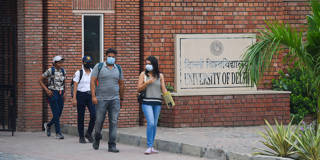The abrupt resignation of an economics professor from a prestigious private university has highlighted concerns about academic freedom in India. The country will never be a “vishwaguru” (teacher to the world), as Prime Minister Narendra Modi often boasts, unless the government stops silencing dissenting voices.
GENEVA – Since enacting the National Education Policy 2020, India has sought to position itself as a twenty-first-century knowledge hub featuring globally competitive institutions of higher education. But the abrupt resignation of a young economist from one of the country’s most prestigious universities, and the subsequent campus revolt over his exit, casts doubt on India’s ability to realize this ambition.

GENEVA – Since enacting the National Education Policy 2020, India has sought to position itself as a twenty-first-century knowledge hub featuring globally competitive institutions of higher education. But the abrupt resignation of a young economist from one of the country’s most prestigious universities, and the subsequent campus revolt over his exit, casts doubt on India’s ability to realize this ambition.